|
|
|
|
|
|
|
|
|
|
|
||
|
|
||
|
Russian 40th Anniversary of Victory in the Great Patriotic War Medal (North Atlantic Convoy Medal) |
||
| The statement below is taken from the Veterans Agency website without any attempt to doctor the political nature of the text |

| |
|
In the past, the Russian Government has offered medals to British veterans
to commemorate significant anniversaries of the end of the Second World War.
An approach was made to the Foreign and Commonwealth Office (FCO) by the
Russian authorities in the mid-1980s when their 40th Anniversary of Victory
in the Great Patriotic War Medal (also known more commonly as the Russian
Convoy Medal) was offered to British ex-Servicemen. Originally
instituted in 1985 and offered to British
veterans shortly afterwards, permission was not granted for it to be
accepted and worn at that time. Some years later, further official
approaches by the Russians to the British Government through the FCO were
reconsidered. In 1994 The Queen granted permission for this medal to be
accepted and worn by eligible British citizens.
(The reason/excuse:) This was considered acceptable in the light of changed circumstances in Russia since the medal was first issued, the improvement in relations between the United Kingdom and the Russian Federation, and the fact that the medal was a commemorative issue, recognising the passing of forty years since the end of the war, rather than a foreign campaign medal. It was made clear at that time that it was not envisaged that permission would be given for any future anniversary medals issued by foreign or Commonwealth Governments to be accepted and worn by British citizens where they related to services wholly rendered more than five years prior to the proposal to make the award. (This is followed by the
following pretentious twaddle:) Despite this, the Russian
authorities made a similar approach to the British Government in 1995 when
they produced their 50th Anniversary
of Victory commemorative medal. (Available on ebay
for rediculously low prices) They were advised that permission to receive and wear this
medal would not be sought from The Queen as The Sovereign does not recognise
awards that commemorate an anniversary where permission has already been
granted to receive and wear an award for an earlier anniversary of the same
event. |
||
|
|
||
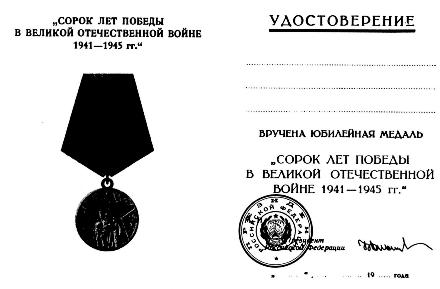
|
|
|
|
|
||
| The obverse and reverse of the Russian Convoy Medal | ||
|
|
||
| The Arctic Emblem | ||
|
Service in the Arctic during the Second World War was recognised by the
award of campaign stars at the end of the war. The criteria for the Atlantic
Star include service with the convoys to North Russia and those who served
in the campaign in Norway in 1940 qualified for the 1939-45 Star on entry
into theatre instead of having to complete six monthsí operational service
as was usual for that star.
Veterans have long campaigned for their part in getting vital supplies to the then Soviet Union to be recognised by a separate medal. (Political "spin" follows:) Mindful that those who served in the Arctic regions were often subjected to especially dangerous circumstances including extreme weather conditions and determined resistance from German forces, the Prime Minister and his Cabinet colleagues believe that the service given and the conditions undergone by the Arctic veterans warrant tangible recognition in the form of something that can be worn. As a result, on 7 March 2005 the Prime Minister announced at a reception for Arctic veterans, the introduction of a new Arctic Emblem that can be worn as a unique, recognised addition to medals. Among the armed forces and Merchant Navy veterans to receive the award on HMS Belfast was 86-year-old Commander Eddie Grenfell, who was instrumental in the campaign for recognition. Cdr Grenfell, of Havant, Hampshire, said: "We are very happy with the outcome but the only question that we have is why did we have to wait so long? It should have been done right at the beginning." He campaigned for a medal rather than an emblem to be awarded but a decision was made in 1946 not to create any more medals for WWII campaigns. |
||
|
|
|
|
|
|
||
| The Arctic Star | ||
| The award of an emblem rather than a medal was poorly received with views considering the emblem was no better than an item from a cereal packet! | ||
|
|
||
| The lingering feeling of being let down did not surface again in the press until 2012, with the following in The Times: | ||
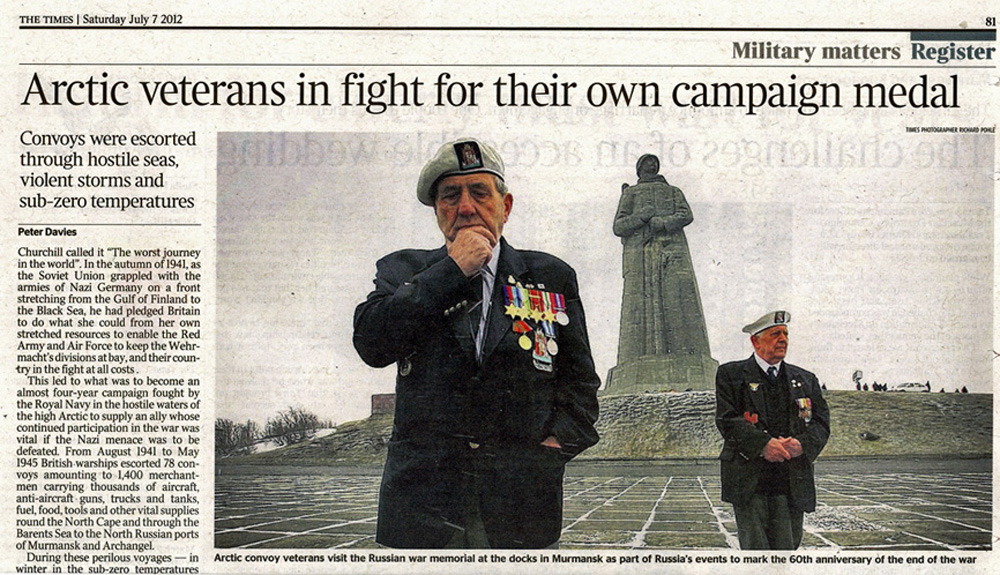 |
||
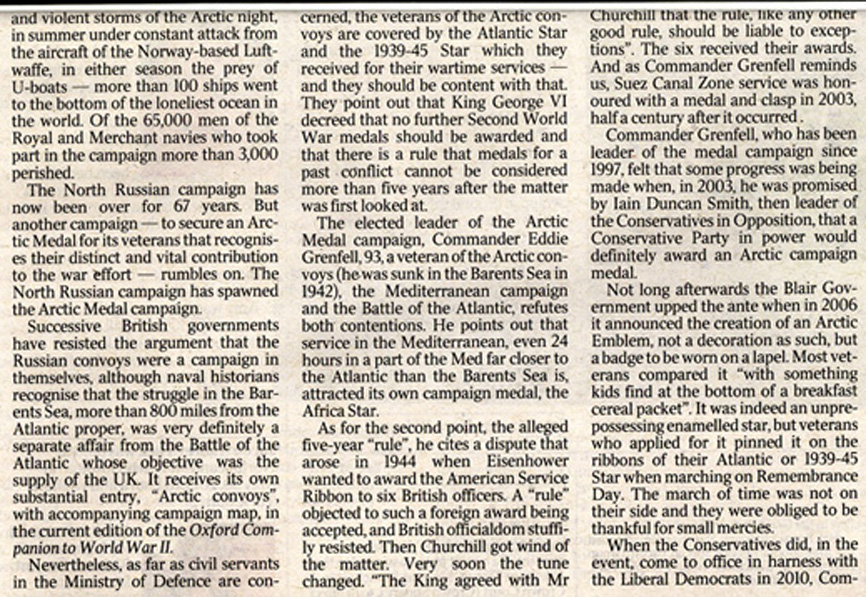 |
||
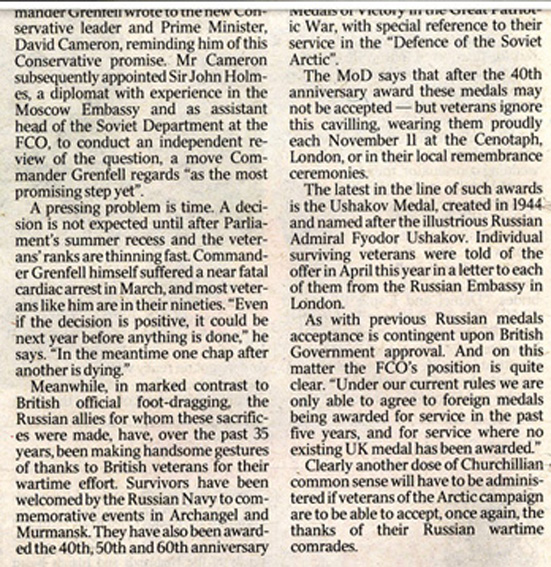 |
||
| This article was quickly followed with the following letter in The Times with a somewhat different viewpoint: | ||
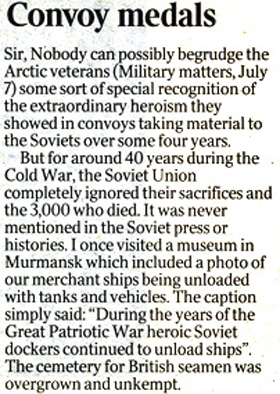
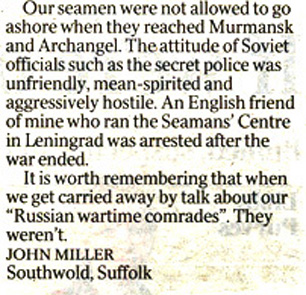 |
||
| The Government reaction to the request from the Russians to present the Ushakov medal was inevitable: | ||
 |
||
 |
||
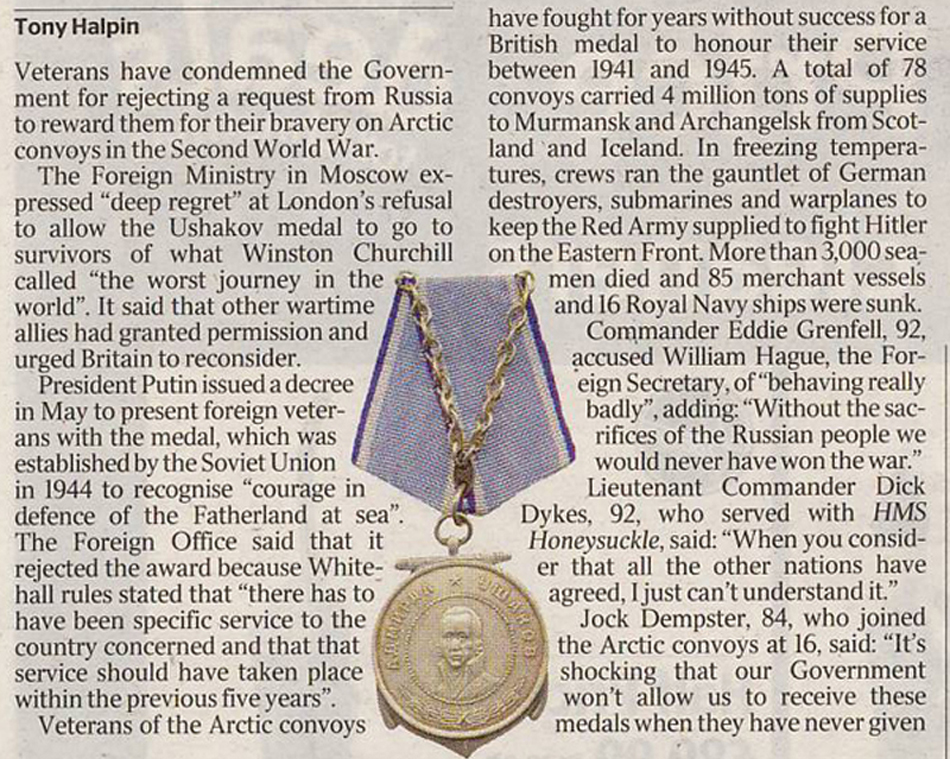 |
||
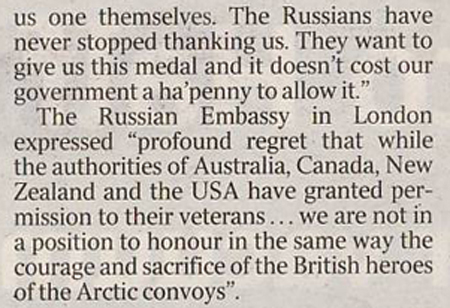
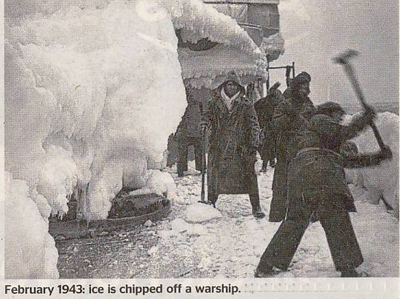 |
||
| again correspondents were quickly off the mark: | ||
|
|
||
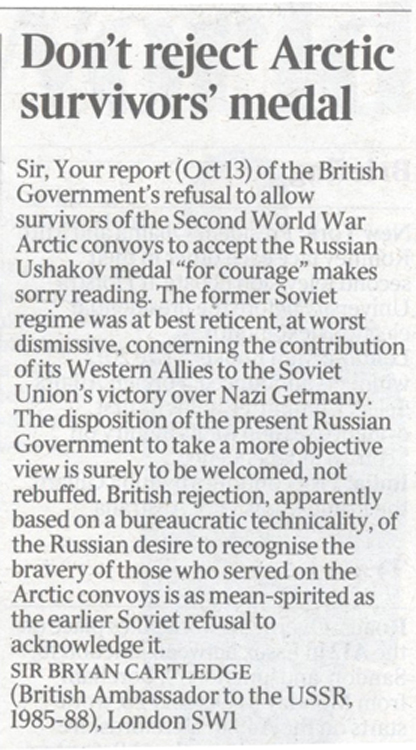
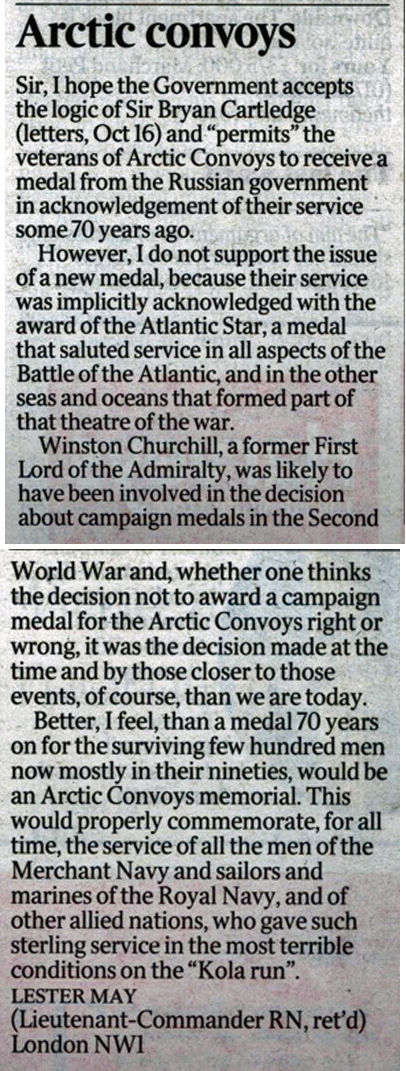 |
||
|
This story will no doubt run and run... ...but on 20 Dec 2012 the situation changed... |
||
 |
||
 |
||
| and true (?) to their word: | ||
 |
||
|
|
Commander Eddie Grenfell |
|
|
|
|
|
|
|
| Britain is finally to award medals to Second World War veterans of the Arctic Convoy missions, David Cameron announced today.The government had previously refused to provide recognition of the sailors' bravery in keeping supply lines open to the Eastern Front, because the conflict was too long ago. Now today, acknowledging that the issue of medals had 'gone on for a very long time', The Prime Minister told MPs a review had concluded that the men would now 'get the recognition they so richly deserve'. But the leading campaigner for that recognition has told how scores of veterans of the Arctic Convoy have missed out because they 'died waiting' for Mr Cameron to act. | |
|
|
|
|
Removing Ice from a Russian Convoy ship |
|
|
Commander Eddie Grenfell said today's
hard-fought victory was tainted because so many shipmates had been denied
due to politicians 'who have never heard a shot in their lives'. Mr Cameron told the Commons he had accepted an expert review's recommendation that an Arctic Star medal should finally be minted - 67 years after the end of the Second World War. He said: 'On this issue of medals that has gone on for a very long time, I'm delighted to be able to tell the House that we have reached a resolution. More details will come from the MoD in the new year, including how vetearns can apply. There will be an Arctic Convoy Star medal. 'I am very pleased that some of the brave men of the Arctic Convoy will get the recognition they so richly deserve for the brave work they did.' But 92-year-old Cmdr Grenfell, from Portsmouth, said he should have acted more quickly to implement a change that had been promised to him by a succession of Conservative leaders in opposition. 'We are pleased but not delighted,' he said. |
|
|
|
|
|
Removing Ice from a Russian Convoy ship and Aircraft Carrier |
GMA: Grumman Martlet (Wildcat) fighter aircraft |
|
'As soon as David Cameron came to power I
reminded him of the promise - only now has he got around to doing it. In
the meantime God knows how many of my Arctic Convoy chums have died
waiting. 'All because we were waiting for these bloody politicians who
have never heard a shot in their lives to make up their minds.' In May the PM launched a study, led by former diplomat Sir John Holmes, into the rules on military decorations. More than 66,000 British sailors and merchant seamen braved sub-zero temperatures and ran the gauntlet of German warplanes and U-boats to keep the Soviet Union supplied on the Eastern Front. Winston Churchill once described them as having made 'the worst journey in the world'. Only around 200 veterans are still alive today - a fifth of the number a decade ago. Many wanted a medal as their 'dying wish'. Mr Cameron came under intense pressure to agree to a British medal, after Russia awarded commemorative medals to acknowledge its gratitude to the surviving sailors, more than 3,000 of whose comrades were killed. Lieutenant Commander Dick Dykes, 92, from of Whitchurch, Hampshire, served in HMS Honeysuckle during the daring missions. He said: 'Itís first class news. Itís the perfect Christmas present after all these years of waiting. |
|
|
.......and finally..... |
|
|
|
|
|
The end of a 67 year saga! |
|
|
|
|